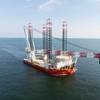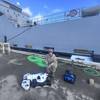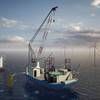Navy, USCG Join Forces For Homeland Security
For the first time, U.S. Navy ships will be employed jointly with the U.S. Coast Guard to help protect our nation’s coastline, ports and waterways from terrorist attack.
“The Atlantic Fleet is working closely with the Coast Guard to ensure the security of our Gulf and east coast ports,” said Admiral Natter. “These ships will be used for coastal patrol and interdiction efforts with the Coast Guard. PC’s are extremely versatile and can provide important additional capabilities to help defeat terrorism.”
Under Operation Noble Eagle, the four Atlantic Fleet PC’s will be used for United States coastal patrol and maritime homeland security operations under the tactical control of the Coast Guard Atlantic Area command. Operational control of the ships, normally assigned to United States Special Operations Command (USSOCOM) through Commander, Naval Special Warfare Command (CNSWC), was recently shifted to Atlantic Fleet Navy commands. “The Cyclone-Class of Navy ships are particularly suited for the maritime homeland security mission,” Allen said. “New threats require new thinking. These highly capable ships and Navy crews, along with the Coast Guard’s unique authority and law enforcement expertise, provide a capable and versatile ocean craft that we need to fight terrorism in the maritime environment.” As the lead agency for maritime homeland security, the Coast Guard is responsible for protecting more than 360 ports and 95,000 miles of U.S. coastline. Together with the U.S. Navy and federal, state and local law enforcement, the Coast Guard has been conducting its largest port security operation since World War II. The PCs will continue to be manned and operated by Navy crews, but a small team of specially trained Coast Guard law enforcement officers from Coast Guard Tactical Law Enforcement Team North (TACLET), based in Yorktown, will deploy aboard each of the ships on maritime homeland security patrol to conduct law enforcement boardings of vessels at sea, prior to the vessel’s entry into a U.S. port. The PCs will also be used to provide anti-terrorism/force protection for Naval ships and escort commercial ships in and out of U.S. ports.
U.S. Navy personnel, as members of the Department of Defense, are normally prohibited by law (Posse Comitatus Act) from participating directly in law enforcement activities. Coast Guard personnel, on the other hand, are authorized under 14 USC 89 to board vessels to enforce U.S. law. This arrangement -- having a Coast Guard boarding team aboard a Navy ship -- is similar to the one employed for years in joint Navy-Coast Guard counter-narcotics operations, dating back to the1980s, and Coast Guard law enforcement detachments have deployed aboard U.S. Navy ships worldwide in support of port security and maritime interdiction operations in the Persian Gulf and Southwest Asia.
The PCs involved in this deployment order will be utilized for homeland security for the next six months. Use of PCs for homeland security in the long-term future has not yet been determined. PCs traditionally have been utilized to conduct Naval Special Warfare (NSW) maritime operations, coastal patrol of foreign shores, surveillance, and shallow-water interdiction operations. They frequently operate with the Coast Guard and other military units. These factors make the ships particularly relevant for participation in Operation Noble Eagle.











